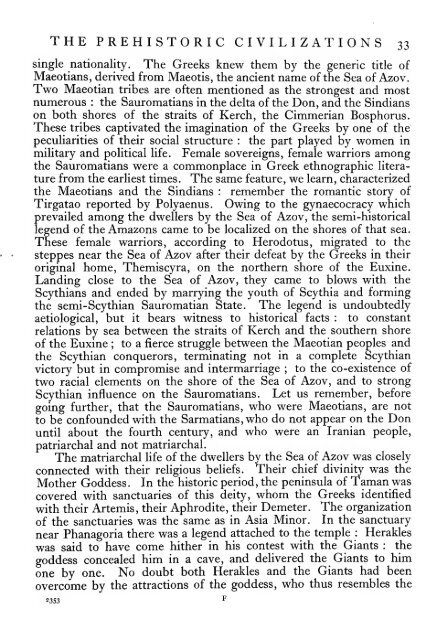Iranians and Greeks in South Russia - Robert Bedrosian's Armenian ...
Iranians and Greeks in South Russia - Robert Bedrosian's Armenian ...
Iranians and Greeks in South Russia - Robert Bedrosian's Armenian ...
You also want an ePaper? Increase the reach of your titles
YUMPU automatically turns print PDFs into web optimized ePapers that Google loves.
THE PREHISTORIC CIVILIZATIONS 33<br />
s<strong>in</strong>gle nationality. The <strong>Greeks</strong> knew them by the generic title of<br />
Maeotians, derived from Maeotis, the ancient name of the Sea of Azov.<br />
Two Maeotian tribes are often mentioned as the strongest <strong>and</strong> most<br />
numerous : the Sauromatians <strong>in</strong> the delta of the Don, <strong>and</strong> the S<strong>in</strong>dians<br />
on both shores of the straits of Kerch, the Cimmerian Bosphorus.<br />
These tribes captivated the imag<strong>in</strong>ation of the <strong>Greeks</strong> by one of the<br />
peculiarities of their social structure : the part played by women <strong>in</strong><br />
military <strong>and</strong> political life. Female sovereigns, female warriors among<br />
the Sauromatians were a commonplace <strong>in</strong> Greek ethnographic literature<br />
from the earliest times. The same feature, we learn, characterized<br />
the Maeotians <strong>and</strong> the S<strong>in</strong>dians : remember the romantic story of<br />
Tirgatao reported by Polyaenus. Ow<strong>in</strong>g to the gynaecocracy which<br />
prevailed among the dwellers by the Sea of Azov, the semi-historical<br />
legend of the Amazons came to be localized on the shores of that sea.<br />
These female warriors, accord<strong>in</strong>g to Herodotus, migrated to the<br />
steppes near the Sea of Azov after their defeat by the <strong>Greeks</strong> <strong>in</strong> their<br />
orig<strong>in</strong>al home, Themiscyra, on the northern shore of the Eux<strong>in</strong>e.<br />
L<strong>and</strong><strong>in</strong>g close to the Sea of Azov, they came to blows with the<br />
Scythians <strong>and</strong> ended by marry<strong>in</strong>g the youth of Scythia <strong>and</strong> form<strong>in</strong>g<br />
the semi- Scythian Sauromatian State. The legend is undoubtedly<br />
aetiological, but it bears witness to historical facts : to constant<br />
relations by sea between the straits of Kerch <strong>and</strong> the southern shore<br />
of the Eux<strong>in</strong>e ; to a fierce struggle between the Maeotian peoples <strong>and</strong><br />
the Scythian conquerors, term<strong>in</strong>at<strong>in</strong>g not <strong>in</strong> a complete Scythian<br />
victory but <strong>in</strong> compromise <strong>and</strong> <strong>in</strong>termarriage ; to the co-existence of<br />
two racial elements on the shore of the Sea of Azov, <strong>and</strong> to strong<br />
Scythian <strong>in</strong>fluence on the Sauromatians. Let us remember, before<br />
go<strong>in</strong>g further, that the Sauromatians, who were Maeotians, are not<br />
to be confounded with the Sarmatians, who do not appear on the Don<br />
until about the fourth century, <strong>and</strong> who were an Iranian people,<br />
patriarchal <strong>and</strong> not matriarchal.<br />
The matriarchal life of the dwellers by the Sea of Azov was closely<br />
connected with their religious beHefs. Their chief div<strong>in</strong>ity was the<br />
Mother Goddess. In the historic period, the pen<strong>in</strong>sula of Taman was<br />
covered with sanctuaries of this deity, whom the <strong>Greeks</strong> identified<br />
with their Artemis, their Aphrodite, their Demeter. The organization<br />
of the sanctuaries was the same as <strong>in</strong> Asia M<strong>in</strong>or. In the sanctuary<br />
Herakles<br />
near Phanagoria there was a legend attached to the temple :<br />
was said to have come hither <strong>in</strong> his contest with the Giants : the<br />
goddess concealed him <strong>in</strong> a cave, <strong>and</strong> delivered the Giants to him<br />
one by one. No doubt both Herakles <strong>and</strong> the Giants had been<br />
overcome by the attractions of the goddess, who thus resembles the<br />
2353<br />
p

















